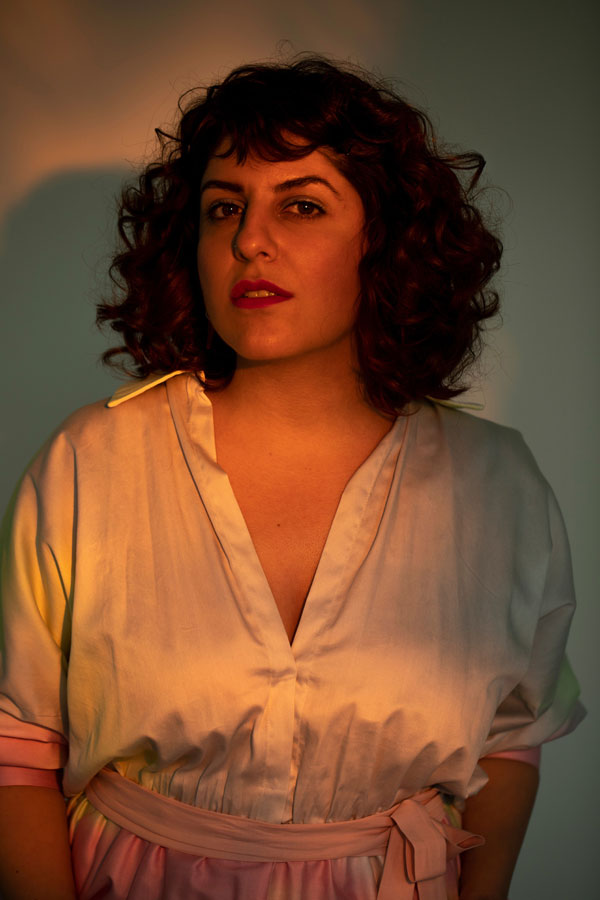Rojin Sharafi, a Tehran-born, Vienna-based sound artist, performer, and composer, fuses raw and abstract emotions with electronic elements that emulate acoustic sounds. Her distinctive musical language intertwines acoustic elements, replicating electronic textures and vice versa, resulting in a synthesis of resilient yet vulnerable and honest sonic expressions. Using a mix of analog, acoustic, and augmented instruments, alongside custom-designed digital tools, Sharafi gained recognition for her debut album, „Urns Waiting to be Fed,“ described as “one of [2019’s] most ecstatic and fiercely original hours of music” by The Quietus. Following this success, she released „Zangaar“ in 2020 and „Kariz“ in 2021. In 2023, Sharafi, together with her band members from HUUUM, published their debut album—an exploration of folk futurism. Sharafi’s music transcends established forms and conventions, venturing into uncharted electroacoustic cartographies. Disrupting hierarchies of rhythm, melody, and timbre, her compositions flow through mutating sounds, avoiding any predictable climax or conclusion. In this sonic journey, traces of traditional Iranian music subvert against metallic percussion, 8-bit particles, and nuanced textures, challenging logical canons and probing the unknown without alienating the audience. Her live sets has been showcased at festivals and venues worldwide, from London to Riga, Budapest to New York, reflecting Sharafi’s versatile and innovative contributions to the global contemporary music scene.

In 2008, the Iranian/Canadian vocalist, composer and multi-instrumentalist Golnar Shahyar settled in Vienna and began studying voice and guitar at the University of Music and Performing Arts. Her timing was auspicious: a generational change was gathering strength on the music scene. The stubbornly traditionalist mindset that had held sway for decades was beginning to crumble, gradually giving way to an increased interest in experimentation and transcending old boundaries, both aesthetic and cultural. Many musicians were increasingly questioning the contrived distinctions between “serious” and “popular” music, as well as the Eurocentricity received from previous generations.
Golnar’s musical aspirations found fertile soil in these circles, as did her passion for social justice in all its forms. She quickly made a name for herself in Vienna, and today she is widely known as one of the most accomplished vocal artists in European contemporary and improvised music, as well as a composer and producer of her own music and a collaborator in dance, theater projects and opera productions.
Her debut album “Tear Drop”, released in November 2022, was nominated in the German Jazzpreis for the best debut album of the year (international). Her work – with groups like Choub, Gabbeh, and the Golnar & Mahan Trio, and as a solo artist under the name GolNar – is an extraordinary prism of languages and styles, drawing equally from the traditions of Western Asia and North Africa and from the contemporary music of Europe and the Americas. There is no meaningful division between her music and the social themes it addresses; she came of age in a culture where women, for decades, have fought for a public voice. Add to that the status of an outsider in Western Europe, representing a culture often viewed with mistrust and misunderstanding, and music-making in itself becomes a political act.
Still, attempting to meld politics and art is risky: if music is to carry a political message it must be of the very highest quality, be able to stand on its own. Fortunately, all of the above facts – as interesting as they are – pale next to Golnar’s supreme musicianship. Her voice is an exquisitely honed instrument, evocative and astonishingly flexible.She has the improvisor’s gift of balancing the familiar and the unexpected; her fine control of pitch, timbre, accent, and breath allow her to use them each as individual elements or to unite them all in the service of a lyric.
Golnar’s music creates a landscape of emotion and narrative, informed by tradition and yet completely her own. Many of her songs bear the weight of tragedy: of war, repression, the personal struggles that we all share…yet for all that, there is nothing negative about her music. She is gracious and open, on stage and in life, and even the darkest, most tragic stories are delivered with an underlying sense of release: as if she is purging herself, and us, of the darkness, so that we might look toward the light and right the wrongs of which she sings.

„David Six zeigt sich als Experte darin, weite Räume zu schaffen, die jedem einzelnen Ton, jeder Melodie und auch jedem klanglichen Experiment fern jeder Verkopftheit tiefergehende Geltung verleihen!“
(Michael Ternai)

Simon Zöchbauer ist als Komponist und Musiker ein Forschergeist. Freidenkend und verspielt, mit der Akribie eines Wissenschaftlers und der Tiefgründigkeit eines Philosophen, vermisst er musikalische Landschaften, gräbt nach Wurzeln und blickt hinter Fassaden, die seine Lebenswirklichkeit ausmachen.
Die Laufbahn eines Berufsmusikers schlägt er ein, nachdem ihm der 1.Preis mit Auszeichnung des Bundeswettbewerbes Prima La Musica 2003 überreicht wird und ihm die Gewissheit verleiht, eine künstlerische Ausdrucksform gefunden zu haben. Sein Trompetenstudium führt ihn schließlich von der Anton-Bruckner-Universität in Linz die Donau abwärts nach Wien an die Universität für Musik und darstellende Kunst, an der er sein Konzertfachstudium bis 2015 absolviert. 2019 folgte der Abschluss seines Masterstudiums in Komposition und Musiktheorie. Auslandssemester absolvierte er in New York City und Karlsruhe.
Nebst seiner Beschäftigung mit der klassischen Musik und ihren technischen Möglichkeiten, setzt sich Zöchbauer in der Vergangenheit mit traditioneller Musik und ihrer Übersetzung in die Gegenwart auseinander. Mit seinem mittlerweile international gefeierten Ensemble „Federspiel“, das bereits die etabliertesten Konzertbühnen weltweit bespielt (Goldener Saal des Wiener Musikvereins, Berliner Philharmonie, Hamburger Elbphilharmonie, u.v.m.), gräbt er nach Wurzeln und tieferliegendem Erdreich.
In seinem Soloprojekt, mit dem Zöchbauer im März 2019 sein Debüt feierte, öffnen sich seine Kompositionen zeitgenössischen und elektronischen Impulsen genauso wie Einflüssen sakraler Musik. Mit der Veröffentlichung des Albums Achad und nicht zuletzt auch durch die Übernahme der Intendanz des wellenklænge Festivals in Lunz am See seit 2018, kristallisiert sich die Gegenwart immer deutlicher als Brennpunkt seines künstlerischen Schaffens heraus. Zöchbauer’s durchdringende Beschäftigung mit der Musik und ihren schöpferischen Bedingungen eröffnen Spielräume, die sich vom Moment aus gleichermaßen in zeitlich Vergangenes wie Zukünftiges projizieren.

Ralph Mothwurf, Komponist und Musiker, lebt und arbeitet in Wien. Er studierte Jazzkomposition und Neue Musik bei Christoph Cech, Carola Bauckholt und Gerd Hermann Ortler.
2019 debütierte Mothwurf als Komponist und Dirigent mit seinem neu gegründeten 22-köpfigen Ensemble „Ralph Mothwurf Orchestra“ im Wiener Musikclub Porgy&Bess. Im selben Jahr wurden acht neue Stücke aufgenommen, die im Dezember 2020 auf dem Album „ZELT“ auf dem Label „Edition Ö1 – Contemporary Jazz“ veröffentlicht wurden. In den letzten Jahren arbeitete er mit renommierten österreichischen Ensembles wie dem Bruckner Orchester und dem Janus Ensemble zusammen und empfing Auftragswerke von Wien Modern, dem Festspielhaus St. Pölten und der St. Florianer Brucknertage.
Mit seinem 2014 gegründeten Musikprojekt „Yasmo und die Klangkantine“ konzertiert Mothwurf im gesamten deutschsprachigen Raum (Wiener Konzerthaus, Jazzfest Saalfelden, Donauinselfest, Wiener Festwochen, ImPulsTanz, …) und wurde als „Songwriter des Jahres“ im Rahmen des „Amadeus Austrian Music Award 2020″ nominiert.
